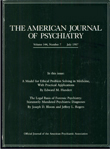Effect of Aging on Cholecystokinin-Induced Panic
Abstract
OBJECTIVE: Epidemiologic surveys have found that the incidence and prevalence of panic disorder decline in later life. The goal of this study was to determine whether aging has an effect on healthy subjects' responses to the panicogenic agent cholecystokinin tetrapeptide (CCK-4). METHOD: The study used a double-blind, placebo-controlled design: 40 subjects 20–35 years old and 40 subjects 65 years old or older were randomly assigned to receive an intravenous bolus of either 50 µg of CCK-4 or normal saline. RESULTS: When given CCK-4, older subjects had significantly fewer and less intense symptoms of panic, shorter duration of symptoms, and less of an increase in heart rate than did younger subjects. CONCLUSIONS: This study found an age-related change in responsiveness to CCK-4. Further research to delineate the mechanism of this change is warranted. (Am J Psychiatry 1998; 155:283–285)



